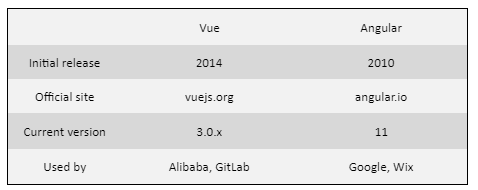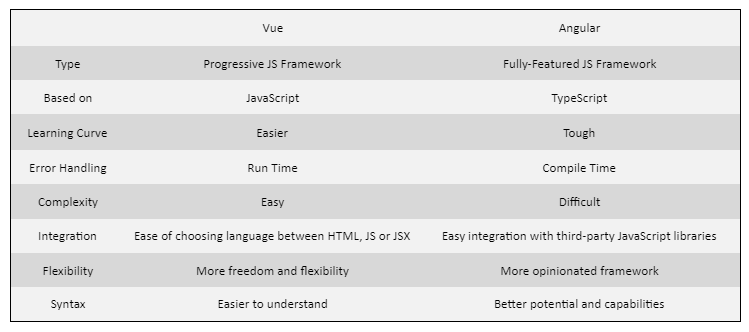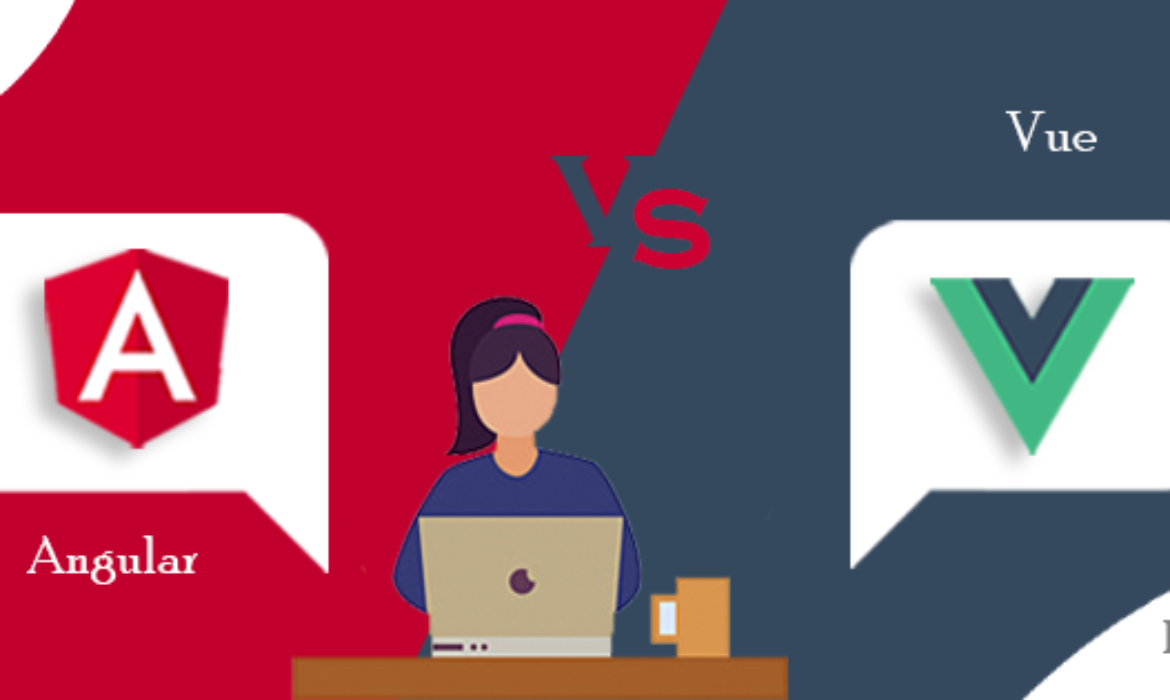Angular Vs Vue: Which Framework Should You Choose In 2021?
What is Angular?
Angular is a leading framework for building heavy JavaScript single-page-based web application. It is an open-source JavaScript framework written in Typescript. Its primary purpose is to develop single-page applications. Angular 12 is the most recent version, and it includes some great new features including Typescript 4.2 support, CLI workflow enhancements, dynamic import for lazy routes, and differential loading.
The Benefits of Angular
Here we are discussing 5 benefits of Angular:
- MVC Architecture implementation
- Deep Linking Module
- Services and Dependency Injection (DI)
- Filters and Tools
- Testing and Maintenance
MVC Architecture implementation
MVC stands for Model View Controller. It is a software design pattern for developing web applications. It is very popular because it isolates the application logic from the user interface layer and supports the separation of concerns.
Deep Linking Module
For single-page app development, Angular provides a wide linking module. It helps understand the way Ajax functions and adds its benefits to your app project.
Services and Dependency Injection (DI)
A service or component might sometimes need other dependent services to complete a task. DI is wired into the Angular framework and used everywhere to provide new components with the services or other things they need. Components consume services; that is, you can inject a service into a component, giving the component access to that service class.
Filters and Tools
Angular offers a variety of filters, tools, and features to help you build a faster and better development environment.
Testing and Maintenance
Angular component testing means to check the quality and performance of your components. Moreover, it may test the complete project with just one tool, such as Protractor, Karma, or Jasmine. It also makes it easier for developers to ensure high-quality results.
Vue is an open-source front-end JavaScript framework for creating user interfaces and single-page applications. It is really popular on the market. Vue 3, the most recent version of Vue.js, it has some exciting features and updates. It incorporates accurate production of standalone reactive objects, template compile warnings with source data, Async error management, the introduction of Slots, etc.
The Benefits of VueHere we are discussing 4 benefits of Vue:
- User friendly
- Memory Consumption
- Readability
Vue.js does not require a steep learning curve, which is beneficial for new programmers. Regarding the learning process, it is interesting to note that Vue.js only requires programmers to know the basics of HTML, JavaScript, and CSS, which is unlike Angular, where additional programming languages are necessary for advanced coding.
IntegrationDevelopers can integrate Vue.js into other frameworks such as React enabling them to customize the project according to their respective requirements. Vue is becoming a popular choice for web development due to its ease of integration with a variety of existing web apps.
Memory ConsumptionAnother advantage of Vue.js development is that the developed application is only 18kb after compression. As a result, it is the ideal choice for users that require low memory consumption and easy access to fantastic features.
ReadabilityBecause Vue is built in JavaScript and has the property of clean code, anyone may use it to easily read and comprehend the code and move the app development process forward.
Now that you have a brief idea about Angular, Vue and its advantages. Here’s a short summary of Angular vs Vue, in terms of their status and history:

Differences between Vue.js vs Angular – Comparison Table

Here are some factors that decide the right front-end development framework between Angular and Vue:
- Learning Curve
- Complexity
- Scalability
- Flexibility
- Developers’ Community and Accessibility
- Architecture
- TypeScript Support
- Ease of Deployment
If you want to build an Angular app, you must know about concepts like MVC and Typescript. However, the same does not go with Vue. Vue is more customizable and has built-in templates, making it easier to use than Angular.
Vue is made with the combination of React and Angular. So that, developers can easily brings Angular or React-based mobility solutions on the Vue.js platform.
ComplexityIn terms of API and design, Vue is simpler than Angular because it was created much later than other JavaScript frameworks, including Angular. On the other hand, Angular is more complex than Vue in the development environment.
ScalabilityBecause of its modular development structure, Angular is more scalable than Vue. On the other hand, Vue uses template-based syntax for lowering the code reusability in large-size applications.
FlexibilityIn comparison with Angular, Vue is more flexible and offers developers official assistance for an extensive array of development systems without pressuring the app structure. This signifies that Vue is a better choice than Angular in terms of flexibility.
Developers Community and AccessibilityAs we have become more familiar with the basics of these two systems, both Vue and Angular have strong network support from large entities like Face book and Google.
These technologies are exactly used by Microsoft, Autodesk, Upwork, Adobe, Apple, Freelancer, Telegram, EuroNews, Alibaba, Xiaomi, Alibaba, GitLab, and Grammarly.
ArchitectureAnother important factor in deciding on the best web app framework is its architecture. For developing dynamic web apps and websites, Angular uses MVC (Model-View-Controller) and MVVM (Model-View-ViewModel).
Vue focuses on the ViewModel and displays only a limited amount of information. As a result, Angular takes the lead in terms of architecture.
App Loading Time and SizeThe most recent Angular versions include tree-shaking and AOT compilation, which significantly reduce app size.
On the other hand, An Angular-based application is not very light like the one developed with the Vue framework.
Ease of DeploymentThe upgraded Angular version introduced features such as dynamic import for lazy routes, CLI workflow enhancements, differential loading, and so on, which simplified the deployment procedure.
In terms of Vue development, you can either import anything into the app arena or create a complex local establishment using CLI that regulates the optimizations of code. You can use elements’ lazy loading and pre-compile the templates present on Vue.
What’s the difference between angular and Vue?Angular is a web app framework, whereas Vue is a progressive framework designed for single-page applications. Angular is ideal for creating large-scale projects, where Vue. js is perfect for lightweight single-page projects.
When to Choose Angular?Angular’s powerful features, such as templating, two-way binding, modularization, RESTful API handling, dependency injection, and AJAX handling, aid in the development of interactive and dynamic single-page applications (SPAs).
You should go for Angular for your development project if:
- Your preferred programming language is object-oriented
- You’ll be working on a large, complex, and dynamic app project.
- It is possible for you to learn TypeScript before starting your project.
- You need trustworthy and simple scalability.
- All you need is a real-time app, such as instant messaging or chatting applications.
You should go for Vue.js for your web app development project if:
- Want to build progressive web apps and single-page applications.
- Want to get started on your project as soon as possible.
- Want to have a better separation of concerns in your project.
- Wish to extend the functionality of existing applications.
The comparison of Angular vs Vue only highlights the similarities and differences between these two frameworks. Angular, on the other hand, is a better option if your business requires scalability over speed.
On the other hand, if you are working on a highly functional yet lightweight, small app, Vue might look like a better choice.
ConclusionI just want to say that Vue has a few great things about it. It has very simple onboarding, it has really very easy way of using directives, you don’t have to learn Classes and OOP, it’s pretty powerful. On the other hand, Angular has a little bit of a higher learning curve but it has some really great things like reactive forms out of the box, it has a really good HTTP client library. Once you understand rxjs, because there’s is a little bit of a learning curve you’ll just love it.
In conclusion, I would say if you are a new developer, I would definitely suggest learn something like Vue first over Angular. However though if you are a more experienced developer and you like Classes and OOP and you are trying to learn a new framework, I think Angular is really powerful and it really pleasure to work in too once you get really good at it.
So I hope that makes sense to you and I am still definitely a huge Vue fan. But I can appreciate Angular and some of the cool things it has too. Once again if you are a beginner web developer, you should definitely choose Vue.

